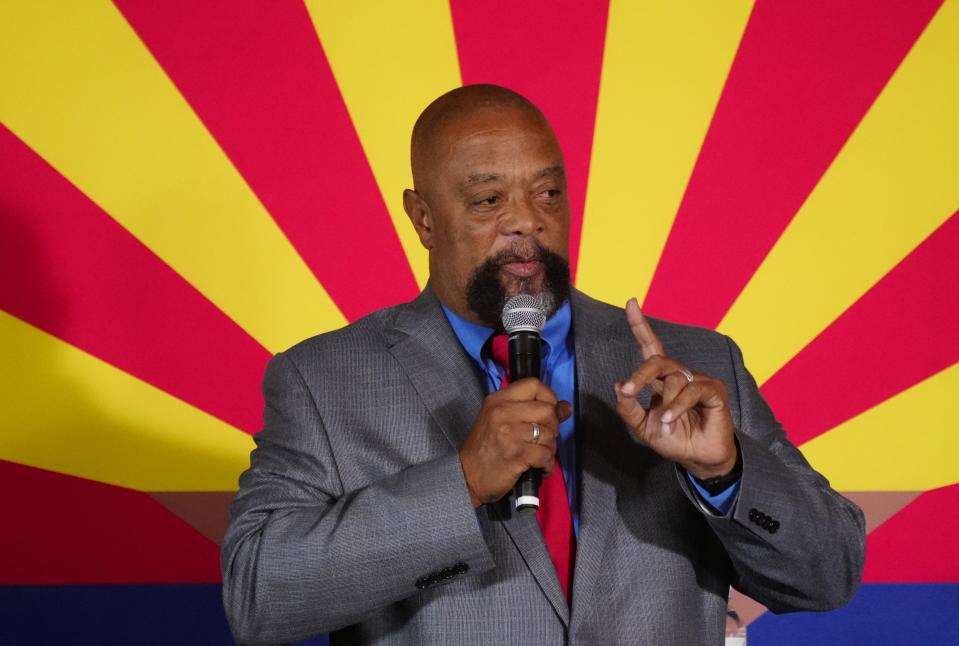Police budgets are getting bigger. New GOP bill wants to make sure they're never cut
Among the latest responses to the “Defund the Police” movement is a bill that forbids Arizona cities and towns to reduce their police budget from the previous year — or risk losing their state shared revenue.
House Bill 2120, sponsored by first-term lawmaker David Marshall, R-Snowflake, passed its first hurdle out of a committee on Monday by a party-line 8-7 vote.
The proposal raises interesting issues, including whether it’s legally permissible to essentially mandate where and how municipalities direct their resources.
But the prevailing question for legislators before they advance the bill further is this:
What problem is it intended to solve?
Arizona is not about to defund police

Defunding police, an idea that rose out of the Civil Rights Movement in the 1960s, gained new steam in the summer of 2020 following the murder of George Floyd by police officers in Minneapolis and Black Lives Matter protests that erupted across the country.
A number of cities, in mostly progressive places like Los Angeles, Portland and Austin, took steps to divert funding from the police department to social services such as helping the homeless.
The decisions wreaked varying degrees of havoc with spikes of homicides and other crimes.
The most extreme version, perhaps, occurred in San Francisco, where a progressive district attorney was elected and took up reforms that included fewer prosecutions of crimes and more leniency for offenders.
The backlash since, however, has been strong and swift. Cities that diverted funding from police have since restored the money — and then some.
But Arizona is not California, Oregon, Minnesota or Austin, Texas.
Even activists who favor cutting funding of law enforcement and the judicial system — some wanting to abolish the police force entirely — would say their efforts to pressure and persuade have found no meaningful support with policymakers.
Just ask the metro Phoenix groups that have been critical of police, such as Puente, or Poder in Action or Mass Liberation.
If anything, police budgets are poised to grow
Voters in Maricopa County twice rejected a progressive Democrat for county attorney, in 2020 and 2022, who had supported moving millions of dollars from the Phoenix police budget to fund mental health services.
In Tucson, arguably the liberal bastion of the state, the progressive City Council rebuffed calls in 2020 and 2021 by activists to slash the police budget. The council did devote more money to bolster community safety by way of additional social workers, a housing first director and a racial equity assessment.
And Tucson, as did Phoenix, created civilian positions to help with non-patrol police work. Phoenix did so in large part because of a staffing shortage and recruitment struggles.
If anything, police budgets stand a better chance at growing rather than shrinking.
Leftist activists say police: Will ‘devastate’ neighborhoods
Technology — witness body cameras and their resulting needs for higher costs to review, code and store camera footage — and perennial considerations for new tools will almost assure that more money will be directed toward police.
And to say nothing, in Phoenix’s case, of additional reforms that may emanate from the ongoing Department of Justice investigation into potential civil rights violations.
Why the HB 2120 ban is still objectionable
HB 2120 is unsurprising in that it reflects a penchant by some Republican lawmakers to intrude in matters of local control. We have seen it with public transit, housing, short-term rentals, red-light cameras and other areas.
Marshall and supporters of his bill see it as a preemptive strike, a disincentive for cities and towns to even contemplate the idea of reducing police financial support.
Needless to say, the League of Arizona cities and towns finds the legislation objectionable.
Residents of cities and towns, too, should find HB 2120 objectionable.
It presumes they cannot speak to their own community’s needs on policing and public safety. And it usurps their voice should they exercise it.
Reach Abe Kwok at akwok@azcentral.com. On X, formerly Twitter: @abekwok.
This article originally appeared on Arizona Republic: Defund police efforts are going nowhere in Arizona. Why ban them?

